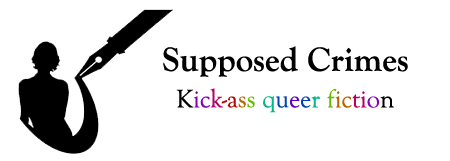
In keeping with this month's theme of creatures, paranormal, and urban fantasy, I thought I'd open a discussion on how these things reflect our real world---and where the line is on using otherworldly as a metaphor.
When the book The Black Witch, by Laurie Forest, arrived on shelves, it was amidst a furor. The novel (and by extension the author) has been accused of racism, ableism, and homophobia. (Note: I have not read it and cannot firsthand confirm this. You can read a review here which outlines the issues. That isn't what I will be talking about here.) One main criticism is the obvious and poorly done use of fantasy races to represent real earthly ones. Some questions this raised for me were, "How far should we take metaphors?" and "What are some ways we can be sure we're not continuing to 'other' marginalized people through speculative fiction?"
These are important questions to ask when it comes to any marginalized community, but here today, I'm specifically asking them about LGBTQIA+ people. Historically, we have not been represented well in media. Non-humans have been used as our stand-ins through speculative fiction for decades.
In the past (and to a degree ongoing), various methods have been employed to queer-code characters (e.g., Disney villains or aliens and creatures). An episode of Star Trek: The Next Generation included a species without gender identification. This episode was, and still is, the subject of disagreement from both within and without the LGBTQIA+ community for how it was portrayed. For me, this episode is relevant and meaningful. However, some of my friends feel the opposite.
Fantasy and alien beings have also been used to allow for exploration of non-heterosexual identities. Any film or television series in which a being inhabits a human body and/or at some point has changed genders is fertile ground for this. It can be frustrating to find actual LGBTQIA+ characters in a sea of "they can kiss, but only if they're not really the same gender." This has improved in more recent media, but the tropes are still hanging on.
There isn't a whole lot of agreement even within LGBTQIA+ communities about whether or not fantasy creatures or aliens make for good or bad representation. It depends on a whole lot of factors. As with anything, the target audience, the premise of the story, and the degree of empathy the author has make a difference.
Personally, I don't care for reading speculative fiction in which the only representation of LGBTQIA+ people are non-humans, unless there are no humans in the story at all. A few of my recent science fiction and fantasy reads have made me wary due to the poor characterization of transgender women, non-binary people, intersex folk, and bisexual and asexual characters. Fostering a sense that gay and lesbian identities are now "normal" but the rest of the letters are still "other" demonstrates that we still have a long way to go.
On the other hand, there are plenty of excellent writers who are tackling issues relevant to LGBTQIA+ communities and to heterosexual people whose relationships fall outside the expected boundaries. It's refreshing to see, for example, polyamorous relationships and kink represented in multifaceted ways. Placing character development at the forefront combined with an author motivated by compassion makes a difference.
What do you think about LGBTQIA+ representation in speculative fiction? What have you liked, what has been troubling to you, and what would you like more of?
